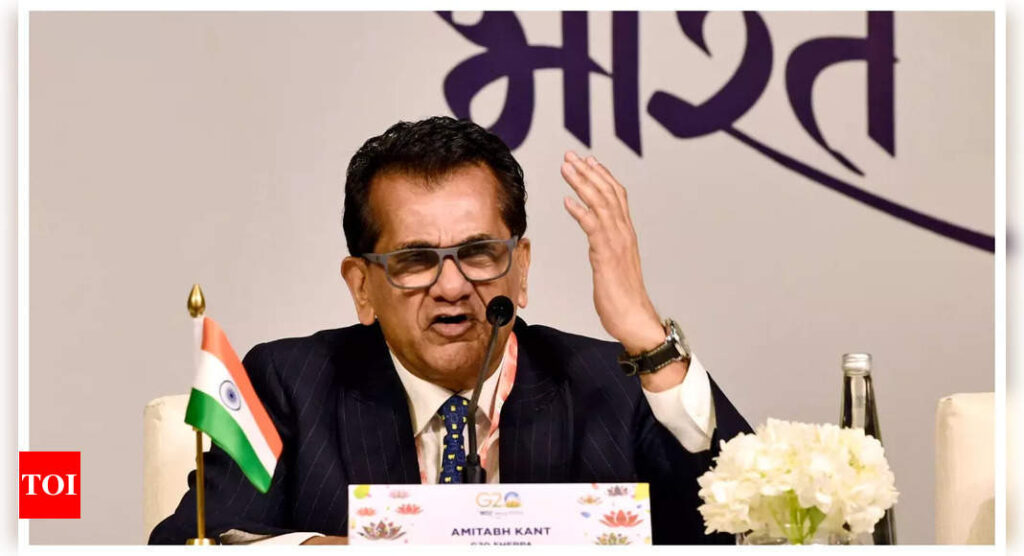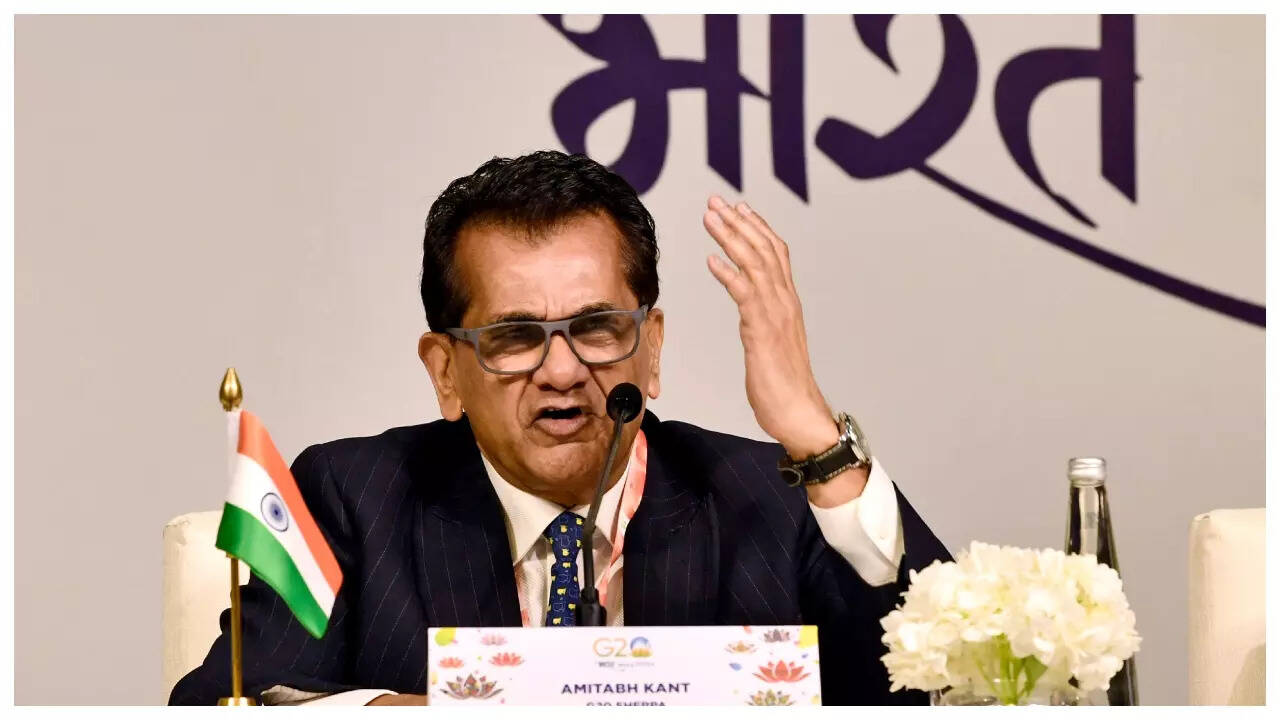[ad_1]
G20 sherpa Amitabh Kant has been in the thick of action right from the time India assumed the presidency of the group. Soon after finalisation of the New Delhi Leaders’ Declaration on Saturday, the key negotiator answered questions from TOI’s Surojit Gupta& Sidhartha, detailing how leaders arrived at a consensus against all odds, while ensuring that the focus on India’s priorities was not lost. Excerpts from the interview:
How was the deal clinched?
n Over two months of hard negotiations went into the New Delhi Leaders’ Declaration (NDLD). During these negotiations, we produced nearly 15 drafts, starting from a fresh slate each time. In addition, nearly 200 bilateral meetings took place. Resolving the geopolitical paragraphs alone required 200 hours of 24×7 negotiations. The negotiations were ruthless and tense. We were very clear from the beginning that we had to achieve consensus. We did not want a divided G20 – we had to drive consensus. That was the only option available to us. Yet, we remained steadfast in our commitment to make the NDLD ambitious, decisive and action oriented.
How was the language on Ukraine finalised?
n We have reaffirmed that all states must act in a manner consistent with the purposes and principles of the UN Charter in its entirety. In line with the UN Charter, all states must refrain from the threat or use of force to seek territorial acquisition against the territorial integrity and sovereignty or political independence of any state. The use or threat of use of nuclear weapons is inadmissible. The Brazilian and South African sherpas, and later the Indonesian sherpa, all joined me in making a joint proposal. The deal was clinched owing to PM Modi’s credibility, and emerging markets working together.
How will you assess the declaration in India’s moment on the global stage? What does it signify?
n India had already arrived on the global stage months ago. We are among the top economies in the world, we have a rich demographic dividend, we are a hub for manufacturing and startups. Our digital public infrastructure has set a new bar for tech-led development in the world. India’s G20 presidency was bolstered by these successes which have unfolded over the last nine years. We were able to lead the most powerful countries of the world and strengthen their belief in our ancient philosophy that the world is one family with a shared future. In another first, our Leaders’ Declaration also shifts the spotlight on to the Global South and we will continue to advocate their interests. With the resounding success of the Leaders’ Declaration, which is perhaps the strongest and most ambitious in the history of G20, India has firmly established itself as a global force to reckon with.
What are the key gains for India from its presidency?
n During the year, we showcased our domestic initiatives and successes through our cross-cutting G20 priorities and outcomes. Our success in driving socio-economic transformation was key in building full consensus with G20 countries. We have left India’s imprint on some of the most critical outcomes of G20 this year.
Climate and energy transition were the other areas where there was resistance from certain quarters. Is it true that you asked those countries to move ahead with the plan instead of ‘lecturing us’?
n Given that countries in G20 are at various stages of development, it was only natural that there would be a divergence of views. However, the urgency on climate action was not lost either. The G20 countries have come together to make several commitments towards gearing up climate action. At the same time, we also made clear the need for urgently scaling up finance and technology transfer to accelerate energy transitions in developing countries.
How was the deal clinched?
n Over two months of hard negotiations went into the New Delhi Leaders’ Declaration (NDLD). During these negotiations, we produced nearly 15 drafts, starting from a fresh slate each time. In addition, nearly 200 bilateral meetings took place. Resolving the geopolitical paragraphs alone required 200 hours of 24×7 negotiations. The negotiations were ruthless and tense. We were very clear from the beginning that we had to achieve consensus. We did not want a divided G20 – we had to drive consensus. That was the only option available to us. Yet, we remained steadfast in our commitment to make the NDLD ambitious, decisive and action oriented.
How was the language on Ukraine finalised?
n We have reaffirmed that all states must act in a manner consistent with the purposes and principles of the UN Charter in its entirety. In line with the UN Charter, all states must refrain from the threat or use of force to seek territorial acquisition against the territorial integrity and sovereignty or political independence of any state. The use or threat of use of nuclear weapons is inadmissible. The Brazilian and South African sherpas, and later the Indonesian sherpa, all joined me in making a joint proposal. The deal was clinched owing to PM Modi’s credibility, and emerging markets working together.
How will you assess the declaration in India’s moment on the global stage? What does it signify?
n India had already arrived on the global stage months ago. We are among the top economies in the world, we have a rich demographic dividend, we are a hub for manufacturing and startups. Our digital public infrastructure has set a new bar for tech-led development in the world. India’s G20 presidency was bolstered by these successes which have unfolded over the last nine years. We were able to lead the most powerful countries of the world and strengthen their belief in our ancient philosophy that the world is one family with a shared future. In another first, our Leaders’ Declaration also shifts the spotlight on to the Global South and we will continue to advocate their interests. With the resounding success of the Leaders’ Declaration, which is perhaps the strongest and most ambitious in the history of G20, India has firmly established itself as a global force to reckon with.
What are the key gains for India from its presidency?
n During the year, we showcased our domestic initiatives and successes through our cross-cutting G20 priorities and outcomes. Our success in driving socio-economic transformation was key in building full consensus with G20 countries. We have left India’s imprint on some of the most critical outcomes of G20 this year.
Climate and energy transition were the other areas where there was resistance from certain quarters. Is it true that you asked those countries to move ahead with the plan instead of ‘lecturing us’?
n Given that countries in G20 are at various stages of development, it was only natural that there would be a divergence of views. However, the urgency on climate action was not lost either. The G20 countries have come together to make several commitments towards gearing up climate action. At the same time, we also made clear the need for urgently scaling up finance and technology transfer to accelerate energy transitions in developing countries.
[ad_2]
Source link











More Stories
We can’t wait to face India in the final: Pat Cummins | Cricket News
Railways plans 3,000 additional trains in next 4-5 years to minimise number of waitlisted tickets | India News
Faridabad: Man dies after ‘falling from hotel room window’ while partying with friends